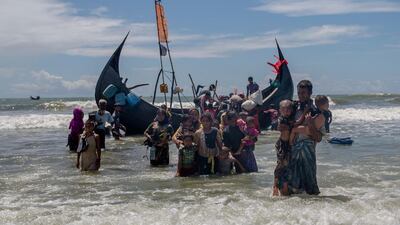As the international community marks World Refugee Day today, the UN Refugee Agency (UNHCR) has released new figures showing that a record number of 68.5 million people have been displaced from their homes due to war, persecution and natural disasters. It seems that each year brings a major new refugee emergency, each one bigger in scope, more urgent than the last and more devastating to the lives of its innocent victims.
Over the recent month of Ramadan and Eid celebrations, UNHCR and its partners worked around the clock to provide better lives for those forced to flee around the globe. We worked tirelessly to provide shelter to more than 720,000 Rohingya refugees battered by monsoon rains in their camps and settlements in southern Bangladesh. Together, we worked to shore up depleted cash assistance programmes for Syrian refugees, who are now spending their eighth year away from home in Jordan and in Lebanon. We worked to rescue large numbers of vulnerable refugees from the hands of traffickers and slave traders in Libya and registered newly displaced Congolese refugees in Uganda, having fled new fighting in the Democratic Republic of Congo. Our teams in Yemen also continued to preposition shelter and supplies for those in need across the country.
As humanitarian needs have increased, available resources have not followed suit. Despite record giving by many donor countries and extraordinary acts of kindness by people from across the globe, UN agencies like UNHCR are faced with large financial deficits, constantly forcing us to divert our overstretched resources towards new crises and to cut back education, health, nutrition and lifesaving programmes.
As for refugees, they are left in a protracted state of limbo – forced to choose between staying isolated for years in underfunded camps or urban situations, dependent on humanitarian aid, with lives on hold and without hope in the future, or to trust their lives to people smugglers and traffickers packed inside a dangerously overcrowded boat or locked inside an airless shipping container. That is a choice no person should have to make.
When he took office at the beginning of 2017, UN secretary general Antonio Guterres called for a "surge of diplomacy" to put an end to today's long-running conflicts and allow the displaced to return to their homes in safety and dignity. This is still urgently required.
______________________
Read more from Opinion:
Editorial: UAE's refuge for refugees is a rare humanitarian gesture in today's world
Sholto Byrnes: Far from a fantasist, Trump is a realist who accepts the world order is changing
Justin Thomas: Third culture kids are a by-product of globalisation – and that's no bad thing
______________________
However, there are some glimmers of hope for refugees. In September 2016, all 193 member states of the United Nations General Assembly pledged to do more to share responsibility for sheltering displaced people and to ease the burden on host countries.
Member states envisioned a world where refugees no longer lived in camps, isolated and cut off from society. Rather, they agreed that displaced people should be included within host communities, able to restart their lives and to forge connections and should be able to study and work legally and to build their skills and their potential.
Studies have shown that, given such opportunities, refugees contribute positively to local economies and fuel the development of their host communities. In this way, refugees are not a threat to their host societies. Instead, they benefit those societies.
In recent months, UNHCR has worked with refugee host countries in Africa and Central America, donor countries, international institutions, UN agencies, the private sector and civil society to formulate more comprehensive and more inclusive responses to displacement for a new Global Compact for Refugees.
The compact provides new opportunities for refugees and host countries. Bilateral and multilateral institutions are coming forward with new sources of financing to address the development challenges posed by large-scale displacement.
Traditional host countries are changing laws and policies, guaranteeing rights and expanding access to national education, healthcare and employment services to enhance refugee inclusion and self-reliance.
New host countries are providing legal access through durable solutions and complementary pathways like innovative new visa systems, educational opportunities and livelihood programmes.
The UAE is one country that has increased its support to displaced persons under UNHCR's mandate during the last year. From providing South Sudanese refugee settlements in northern Uganda with access to education, livelihood opportunities and sustainable water supplies to funding shelter projects to Yemeni displaced people and nutritional programmes to Rohingya refugees in southern Bangladesh; from improving the lives of vulnerable citizens from war-torn countries living in the UAE with visas that would grant them temporary stay or through access to services and the provision of concessions, the country is truly following in the late Sheikh Zayed's legacy of humanitarianism.
In this Year of Zayed, UNHCR hopes that the world will pay attention to the Founding Father's humanitarian legacy, his values and his vision.
However, the current needs are so huge and the challenges are so great that no single organisation or country, however altruistic its citizens, can solve the global displacement crisis alone. The Global Compact, on the other hand, has the potential to mobilise all stakeholders in support of a shared agenda, which will give hope to refugees and a chance of a better future.
Toby Harward is head of the UNHCR in Abu Dhabi

